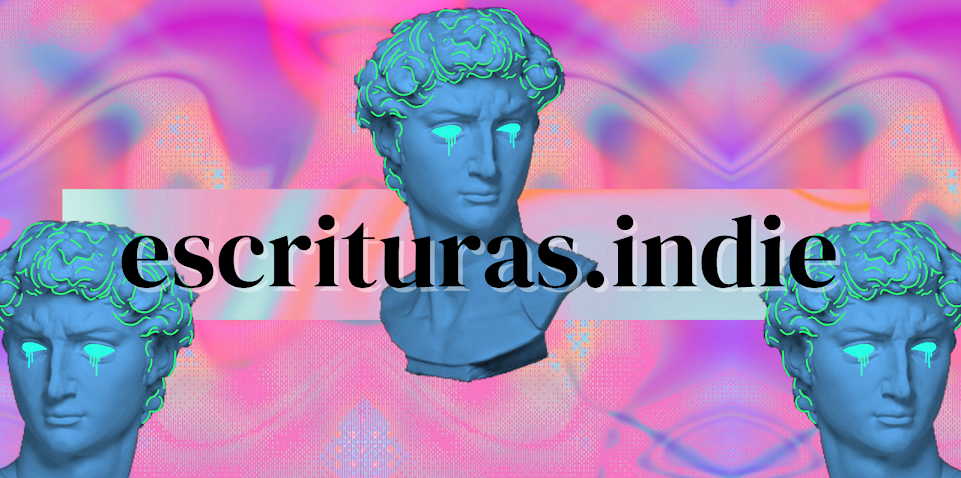Traducciones por Federico Tinelli
 |
collage por @nubelectrica |
La tierra perdida
Tengo dos hijas.
Son todo lo que siempre quise de la tierra.
O casi todo.
También deseé un pedazo de suelo:
Una ciudad atrapada entre colinas. Un río urbano.
Una isla en su elemento.
Para poder decir mío. Mío.
Y en serio.
Ahora crecieron y se fueron lejos
y la memoria
se conviritió en un emigrante,
vagando en un lugar
donde el amor se desarma en un paisaje:
Donde las colinas
son del color de los ojos de un chico,
donde mis hijas son distancias, horizontes:
A la noche,
en el borde del sueño,
puedo ver la orilla de la bahía de Dublín.
Su extensión rocosa y su puerto de granito.
¿Es así, digo,
como lo debieron haber visto
en el crepúsculo, partiendo en el barco de correo,
sombras cayendo
en todo lo que tenían que dejar?
¿Y en lo que amarían para siempre?
Y después
me imagino a mí misma
en el camino hacia la tierra de ese barco
buscando por la última imagen de una mano.
Me veo a mí misma
en el lado infernal del agua,
la oscuridad entrando rápida, diciendo
todos los nombres que sé por tierra perdida:
Irlanda. Ausencia. Hija.
_________
The lost land
I have two daughters.
They are all I ever wanted from the earth.
Or almost all.
I also wanted one piece of ground:
One city trapped by hills. One urban river.
An island in its element.
So I could say mine. My own.
And mean it.
Now they are grown up and far away
and memory itself
has become an emigrant,
wandering in a place
where love dissembles itself as landscape:
Where the hills
are the colours of a child's eyes,
where my children are distances, horizons:
At night,
on the edge of sleep,
I can see the shore of Dublin Bay.
Its rocky sweep and its granite pier.
Is this, I say
how they must have seen it,
backing out on the mailboat at twilight,
shadows falling
on everything they had to leave?
And would love forever?
And then
I imagine myself
at the landward rail of that boat
searching for the last sight of a hand.
I see myself
on the underworld side of that water,
the darkness coming in fast, saying
all the names I know for a lost land:
Ireland. Absence. Daughter.
...
IV Cuarentena
En la peor hora de la peor estación
del peor año para todo el mundo
un hombre salió del geriátrico con su esposa.
Estaba caminando - ambos lo hacían - al norte.
Ella tenía fiebre famélica y no podía mantener el
ritmo.
Él la levantó y se la cargó en los hombros.
Caminó así al oeste y al oeste y al norte.
Hasta que llegaron a la noche, bajo estrellas
heladas.
A la mañana, los dos fueron encontrados muertos.
De frío. De hambre. De las toxinas de toda la historia.
Pero los pies de ella estaban sostenidos contra su
esternón.
El último calor de la carne fue su último regalo.
No dejemos que ningún poema de amor llegue a este
nivel.
Acá no hay lugar para el halago
inexacto de los dones fáciles y la sensualidad del
cuerpo.
Solo hay tiempo para esta vida impiadosa:
su muerte juntos en el invierno de 1847.
También lo que sufrieron. Cómo vivieron.
Y lo que hay entre un hombre y una mujer.
Y en qué oscuridad puede ser mejor probado.
_________
IV Quarantine
In the worst hour of the worst season
of the worst year of a whole people
a man set out from the workhouse with his wife.
He was walking – they were both walking – north.
She was sick with famine fever and could not keep up.
He lifted her and put her on his back.
He walked like that west and west and north.
Until at nightfall under freezing stars they arrived.
In the morning they were both found dead.
Of cold. Of hunger. Of the toxins of a whole history.
But her feet were held against his breastbone.
The last heat of his flesh was his last gift to her.
Let no love poem ever come to this threshold.
There is no place here for the inexact
praise of the easy graces and sensuality of the body.
There is only time for this merciless inventory:
Their death together in the winter of 1847.
Also what they suffered. How they lived.
And what there is between a man and woman.
And in which darkness it can best be proved.
| Sobre la autora |
Eavan Boland fue una poeta irlandesa nacida en 1944. Pasó su infancia en Nueva York y Londres para luego volver a Irlanda y publicar su primer libro, 23 Poems, cuando todavía estaba en la universidad a los 21 años. Desde 1996 fue profesora de la Universidad de Stanford. Escribió más de 30 libros de poesía y en 2018 fue seleccionada como miembro honorario de la Academia Real Irlandesa. Falleció el 27 de abril de 2020 en Dublín a los 75 años.
| Sobre el traductor |
Federico Tinelli es un poeta, traductor y periodista nacido en Buenos Aires, Argentina, en 1997. Publicó su primer libro de poesía, En el Vacío Azul (2021) por la editorial Tren Instantáneo. Traduce y colabora para Escrituras Indie desde el 2021.

0 comentarios:
Publicar un comentario